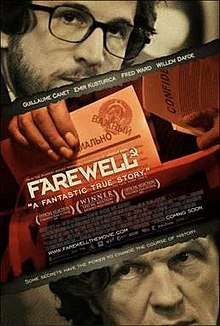Farewell (2009 film)
Farewell (French: L'affaire Farewell; literally The Farewell Affair) is a 2009 French espionage thriller film directed by Christian Carion, starring Guillaume Canet and Emir Kusturica. The film is loosely based on the actions of the high-ranking KGB official, Vladimir Vetrov. It was released in the United States in June 2010.[3] It was adapted from the book Bonjour Farewell: La vérité sur la taupe française du KGB (1997) by Serguei Kostine.
| Farewell | |
|---|---|
 United States theatrical poster | |
| Directed by | Christian Carion |
| Produced by | Philip Boëffard Bertrand Faivre Christophe Rossignon |
| Written by | Christian Carion |
| Starring | Guillaume Canet Emir Kusturica Alexandra Maria Lara Willem Dafoe Fred Ward |
| Music by | Clint Mansell |
| Cinematography | Walther van den Ende |
| Edited by | Andrea Sedlácková |
Production company | |
| Distributed by | Pathé |
Release date |
|
Running time | 113 minutes |
| Country | France |
| Language | French Russian English |
| Budget | $21 million[1] |
| Box office | $7.4 million[2] |
Plot
In the early 1980s, a high-ranking KGB analyst, Sergei Grigoriev, disillusioned with the Soviet regime, decides to pass Soviet secrets, including a list of their spies, to the government of France, then under the newly elected President François Mitterrand, a Socialist in coalition with the Communist Party. Grigoriev (code-named Farewell by the French intelligence service) hopes to force change in the Soviet Union by revealing their extensive network of spies trying to acquire scientific, technical and industrial information from the West. He uses Pierre Froment, a naïve French engineer based in Moscow, as his unlikely intermediary. After the first transfer of information, Pierre confides in his wife Jessica, who is adamant about his stopping this activity in order to safeguard their family. Grigoriev persuades Pierre to continue without telling Jessica. He will accept neither money nor defection as a reward, but sometimes requests small gifts from Pierre's trips to France, such as a Sony Walkman and Queen cassette tapes for his son, some cognac, or books of French poetry. As Farewell's prodigious output blossoms, the French are bewildered by the sheer scale and yield of top Western technology transferred covertly to the Soviets.
Under suspicion that he is not a trustworthy ally, Mitterrand personally hands U.S. President Ronald Reagan a dossier of invaluable Farewell data during the Ottawa G7 summit. The Americans are astounded with it and other information provided by Farewell, culminating in the full "List X" of Soviet spies within the highest echelons of the Western scientific and industrial apparatus. They embark on an ambitious plan to feed the Soviets erroneous or defective data; shortly afterwards, the network of Soviet technology spies in the West is rolled up, and Reagan announces the "Star Wars" antimissile shield project. Deprived of hi-tech information from the West, and with their own laboratories falling behind, the Soviet leadership panics. Seeing this desperate impasse for what it is, Mikhail Gorbachev, then an upwards-mobile party official, starts preparing the reform policies he is to pursue in the future.
Grigoriev's superior, a double agent for the CIA, is directed by them to sacrifice Grigoriev and save the Froments, all unbeknownst to the French. Grigoriev, under arrest and KGB interrogation, plays dumb to give the Froments time to escape. They cover their tracks and flee by car to the Finnish border. While in West Germany for debriefing, Pierre pleads with the CIA Director to save Grigoriev, praising his integrity and selflessness. The director refuses as a policy principle, having brought the other agent to the West. Grigoriev is granted his request of execution by a marksman on the jetty of the snow-clad lake he loves. Pierre is later offered a company job in Manhattan.
Cast
- Emir Kusturica – Sergei Grigoriev (the character based on Vetrov)
- Guillaume Canet – Pierre Froment, an engineer working in the Moscow branch of French electronics conglomerate Thomson-CSF
- Alexandra Maria Lara – Jessica Froment, Pierre's wife
- Willem Dafoe – Feeney, Director of the Central Intelligence Agency
- Fred Ward – U.S. President Ronald Reagan
- Philippe Magnan – President François Mitterrand of France
- Niels Arestrup – Vallier, Director of the DST
- David Soul – Hutton, aide to President Reagan
- Ingeborga Dapkunaite – Natasha, Grigoriev's wife
- Dina Korzun – Alina, a colleague and mistress that Grigoriev is having an affair with
- Yevgeni Vasilyevich Kharlanov – Igor, the Grigorievs' rebellious son
- Christian Sandström – Federal Bureau of Investigation agent
- Diane Kruger, Benno Fürmann, Gary Lewis and Alex Ferns, amongst others, have cameos.
Reception
On review aggregator Rotten Tomatoes, the film holds an approval rating of 86% based on 77 reviews, with an average rating of 7.06/10.[4] On Metacritic, the film has a weighted average score of 74 out of 100, based on 25 critics, indicating "generally favorable reviews".[5]
See also
Further reading
- Thomas C. Reed, At the Abyss: An Insider’s History of the Cold War (2004)
- Sergei Kostin and Eric Raynaud, Adieu Farewell (Laffont, Paris, 2009, in French); "Farewell" (AmazonCrossing, Aug. 2011, in English). First complete investigation of the Farewell Dossier and its international impact.
- Michel Louyot, Le Violon de neige (Publibook, Paris, 2008; soon to be available in English).
References
- http://www.jpbox-office.com/fichfilm.php?id=10875
- https://www.boxofficemojo.com/movies/intl/?id=_fLAFFAIREFAREWELL01&country=FR&wk=2009W39&id=_fLAFFAIREFAREWELL01&p=.htm
- "NeoClassics sets US release for Carion's Farewell". Screendaily.com. Retrieved 30 September 2017.
- "Farewell (L'affaire Farewell) (2010)". Rotten Tomatoes. Retrieved May 5, 2020.
- "Farewell Reviews". Metacritic. Retrieved May 5, 2020.
External links
- Farewell on IMDb
- Allocine.fr article (in French)
- Screendaily.com review (in English)
- Bluefat review (in English)
- SBS Australia: documentary on Vladimir Vetrov